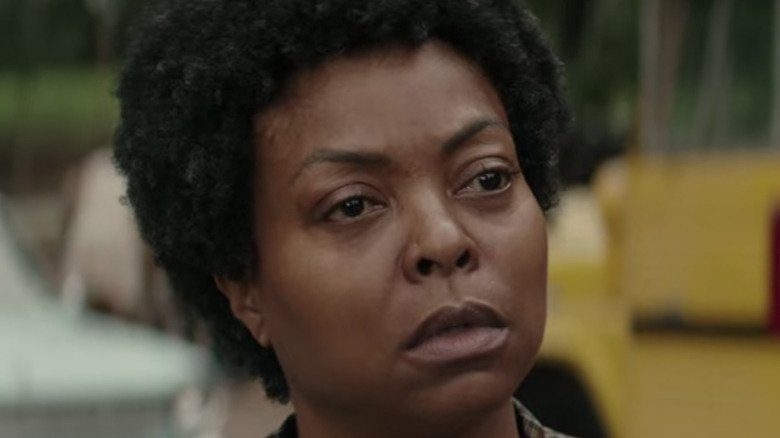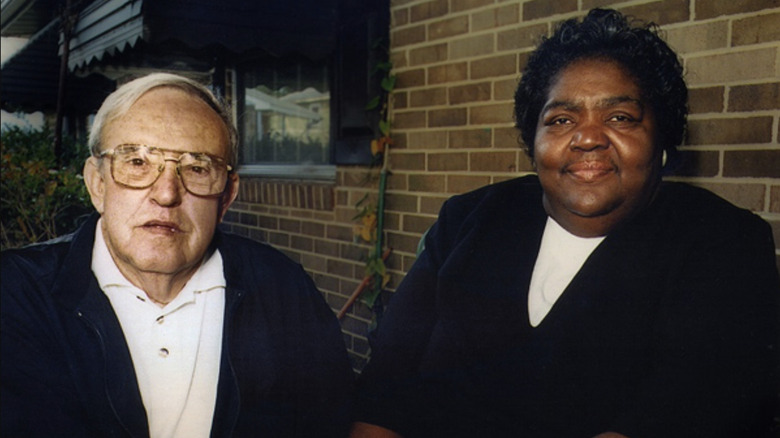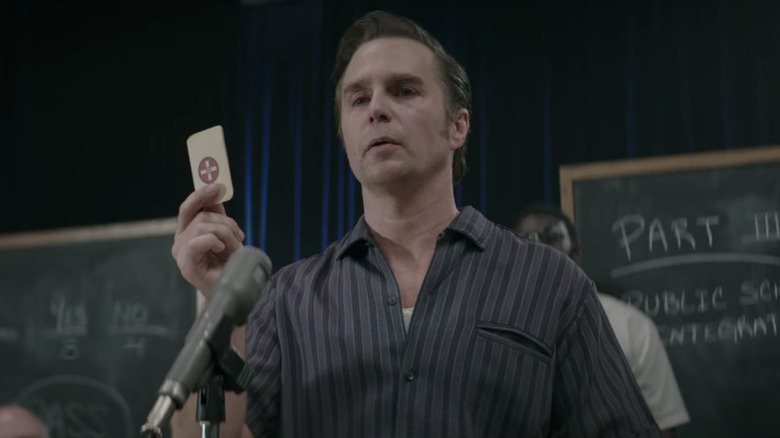Is The Best Of Enemies Based On A True Story?
One of the latest historical dramas to crack Netflix's top 10 list is "The Best of Enemies," a 2019 film based on the book "The Best of Enemies: Race and Redemption in the New South" by Osha Gray Davidson. "The Best of Enemies" tells the story of civil rights activist Ann Atwater (Taraji P. Henson) and Ku Klux Klan leader C.P. Ellis (Sam Rockwell), and their rivalry over school integration in Durham, North Carolina, in 1971. The biographical film racked up five nominations despite its average reviews, and the Rotten Tomatoes critics consensus also commented that it "has the best of intentions, but they're derailed by a problematic perspective and a disappointing lack of insight."
Since "The Best of Enemies" features characters based on real people, many fans are wondering if the movie itself is based on a true story. Though certain plot points may seem unbelievable, it looks like the majority is based in truth — which makes it an even more interesting watch.
The Best of Enemies tells a true story
Aside from being based on a bestselling nonfiction book, "The Best of Enemies" also drew from a documentary about Atwater and Ellis titled "An Unlikely Friendship." According to History vs Hollywood, much of the 2019 film accurately portrays the true story of Atwater and Ellis. Ellis did own and operate a gas station, Atwater did spin councilmen around in their chairs at city council meetings, and both were initially hesitant about integrating their local schools. Some of the more dramatic elements in "The Best of Enemies" also appear to be based on real events, like Atwater wanting to stab Ellis with a knife and Ellis ripping up his KKK member card in public, much to the dismay of his supporters.
The director of "The Best of Enemies," Robin Bissell, told The Hollywood Reporter how he wanted to focus on the true events: "It's not lost on me that I three-dimensionalized a member of the Klan," he explained. "But I did that because that's what Ann Atwater did. It wasn't her business to have to change this guy, but she suddenly saw him as a person — not a good person, but a human — and he started seeing her that way. She saw a little crack in there, and said, 'I can get in there.' And he wasn't just a guy, he was the leader of the Klan. He had hundreds of men who would follow him to the ends of the earth. So if she could change him, she knew it would have some kind of trickle-down effect. And it did."
Though "The Best of Enemies" managed to stick to the facts, for the most part, some critics thought it focused on the wrong parts of the story.
Some think The Best of Enemies suffers from white saviorism
Several critics have noted that "The Best of Enemies" is yet another example of the problematic white savior trope. Since the majority of the film seems to focus on Ellis, some think it feels more like his story rather than that of his and Atwater's working relationship. Odie Henderson of Roger Ebert commented, "Director Robin Bissell's script has more sympathy for, and pays more attention to, the Klansman than the Black children whose future may be forever damaged by the outcome of the charrette. Despite having an equal share in the story, Ann Atwater is pushed into the background, sometimes disappearing from the film for stretches at a time."
Tambay Obenson of IndieWire explained why the white savior trope is hurtful: "Audiences are routinely fed a saccharine treatment of racial conflict in movies that center the transformations of white protagonists (whether real or concocted), in what ultimately becomes a sort of interracial buddy-comedy-drama, as is the case with films like 'The Best of Enemies' and 'Green Book.' These movies shield white audiences from the true horrors of the period, particularly the physical and psychological toll on many black people faced with intimidation and violence, by relegating them to supporting roles in their own fight for freedom and recognition."
Though Atwater died in 2016, Bissell and the rest of the crew on "The Best of Enemies" got approval from her family for both the movie and Henson's portrayal of her. Atwater's granddaughter Ann-Nakia Green attended the premiere and dubbed it "moving, funny, beautiful, and relevant" (per THR). Henson also commented on the family's acceptance of her role, telling the outlet, "The family said I was spot-on. I gave it my all. It was very important for me to get it right because she has a whole community that loves her and lifts her up still."
Thankfully, there are plenty of online resources to read further about Atwater and Ellis's collaboration, and how the two were able to come together to enact change in their city — without sugarcoating the upsetting parts of history.


